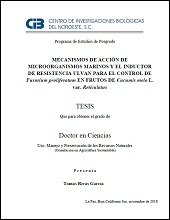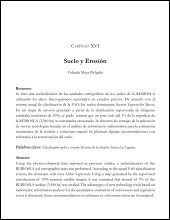| dc.contributor | Luis Guillermo Hernández Montiel | |
| dc.contributor | Bernardo Murillo Amador | |
| dc.creator | TOMAS RIVAS GARCIA | |
| dc.date | 2018-11 | |
| dc.identifier | http://cibnor.repositorioinstitucional.mx/jspui/handle/1001/1464 | |
| dc.identifier.uri | http://dspace.cibnor.mx:8080/handle/123456789/2813 | |
| dc.description | "El melón (Cucumis melo L.) es un fruto popular entre los cultivos hortícolas por su sabor y contenido nutricional. Por sus características fisiológicas y malas prácticas de manejo, es susceptible a enfermedades fúngicas como la pudrición del fruto ocasionada por Fusarium spp. causando pérdidas económicas considerables. Su control se basa en la aplicación de fungicidas sintéticos como el benomil, sin embargo, genera resistencia en los fitopatógenos, daños a la salud y contaminación ambiental. El control biológico es una alternativa al uso de los agroquímicos. Los microorganismos de ambientes marinos por sus características metabólicas pueden ser utilizados como agentes de control biológico (ACB). Para mejorar la eficiencia de los ACB, es importante elucidar los mecanismos de acción y realizar tratamientos conjuntos para obtener un amplio espectro de acción y resultados comparables a los de fungicidas sintéticos. Por otra parte, el uso de inductores de resistencia como ulvan, ha sido aplicado con éxito para el control de enfermedades en las plantas, existiendo poca información sobre su uso en poscosecha. Como objetivo se evaluaron los mecanismos antagónicos de D. hansenii, S. rhizophila y ulvan como tratamiento individual o conjunto hacia F. proliferatum en frutos de melón. La identificación del fitopatógeno se realizó por claves taxonómicas y marcadores moleculares. Se realizó un screening para seleccionar los microorganismos marinos más eficientes en el control de la pudrición sobre frutos de melón. Se determinó que ulvan no tiene efecto directo sobre D. hansenii y S. rhizophila, al medirse la tasa de crecimiento de los ACB in vivo e in vitro. En los mecanismos de acción, la competencia por nutrientes y la producción de enzimas líticas se cuantificaron inoculando los ACB en medio a base de melón suplementado con pared celular del hongo. La producción de compuestos volátiles orgánicos (VOCs) se evaluó por cultivo dual y la actividad bio-surfactante por dispersión en membranas hidrófobas e hidrofílicas. En frutos inoculados con los ACB y ulvan se midió la actividad de enzimas antioxidantes y de defensa. In vivo se inocularon a los ACB para determinar la incidencia de enfermedad, lesión y parámetros de calidad..." | |
| dc.description | "Muskmelon (Cucumis melo L.) is a popular fruit between horticultural crops because its flavor and nutritional content. Muskmelon fruit possess physiological characteristics (climacteric stage) and inefficient manage, which make it susceptible to postharvest disease by Fusarium spp. fruit rot principally and economic losses. Synthetic fungicides such as benomil are the conventional treatment, but its indiscriminate use cause fungi resistance, healthy problems and pollution. Biocontrol is an emerging treatment based on the use of antagonistic microorganisms. Marine microorganisms are promissory candidates as biological control agents (BCAs) because it’s metabolic characteristics. It is important to elucidate the mechanisms of action and to mix treatments in order to enhance the efficiency of individual treatments of BCAs to make them better than fungicides. On the other hand, the control of plant diseases with ulvan as resistance inducer has been successfully studied, but there are few reports about ulvan application in postharvest control diseases. The aim of this study was to evaluate antagonism mechanisms of D. hansenii, S. rhizophila and ulvan as single or mixed treatments against fruit rot caused by F. proliferatum. The phytopathogen identification was based on key taxonomic and molecular markers. After screening test, the more effective marine microorganisms in the biocontrol of fruit rot were selected and used in the next experiments. Ulvan did not have direct effect over in vivo and in vitro growth of BCAs. Nutrients competition and lytic enzymes production were evaluated on based muskmelon medium. VOCs excretion was evaluated by dual culture and bio-surfactants excretion by hydrophobic and hydrophilic membranes dispersion. Muskmelon were inoculated with BCAs and ulvan to determinate the activity of enzymes related to oxidative stress and defense. Muskmelon were also inoculated to quantification the incidence, lesion diameter and quality parameters. In conclusion, D. hansenii and S. rhizophila inhibited F. proliferatum growth by diverse mechanisms such as parasitism, nutrients competition, mycoparasitism by lytic enzymes, bio-surfactants and VOCs. Marine microorganism and ulvan induced antioxidant and defense enzymes activity. The BCAs on this study used as mixed treatment are a promissory alternative on postharvest control of fruit rot in muskmelon." | |
| dc.format | application/pdf | |
| dc.language | spa | |
| dc.publisher | Centro de Investigaciones Biológicas del Noroeste, S. C. | |
| dc.rights | info:eu-repo/semantics/openAccess | |
| dc.rights | http://creativecommons.org/licenses/by-nc-nd/4.0 | |
| dc.subject | info:eu-repo/classification/AUTOR/Debaryomyces hansenii, Stenotrophomonas rhizophila, ulvan, control biológico, microorganismos marinos | |
| dc.subject | info:eu-repo/classification/AUTOR/biocontrol, marine microorganisms | |
| dc.subject | info:eu-repo/classification/cti/6 | |
| dc.subject | info:eu-repo/classification/cti/31 | |
| dc.subject | info:eu-repo/classification/cti/3108 | |
| dc.subject | info:eu-repo/classification/cti/241709 | |
| dc.subject | info:eu-repo/classification/cti/241709 | |
| dc.title | Mecanismos de acción de microorganismos marinos y el inductor de resistencia ulvan para el control de Fusarium proliferatum en frutos de Cucumis melo L. var. Reticulatus | |
| dc.type | info:eu-repo/semantics/doctoralThesis | |
| dc.type | info:eu-repo/semantics/acceptedVersion | |


